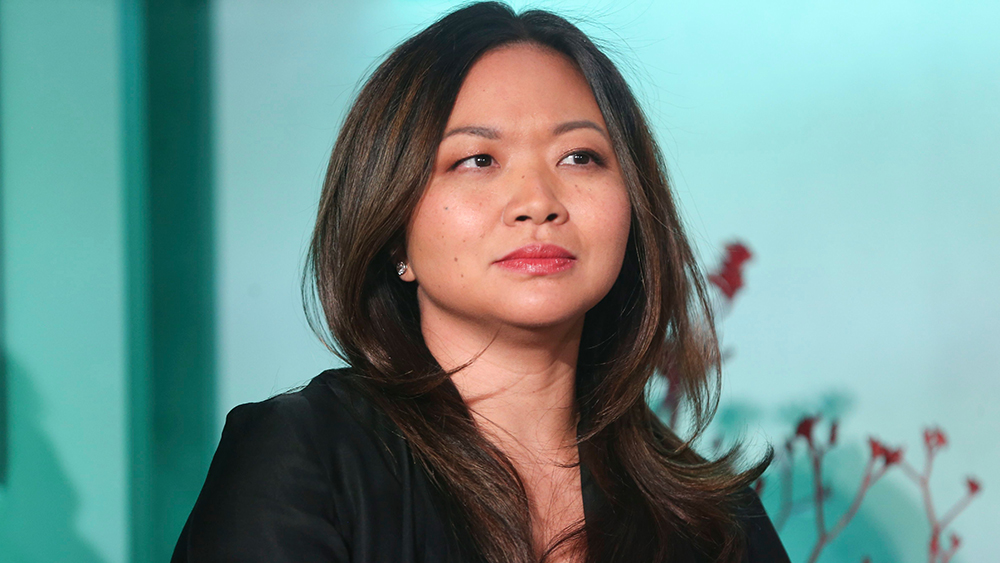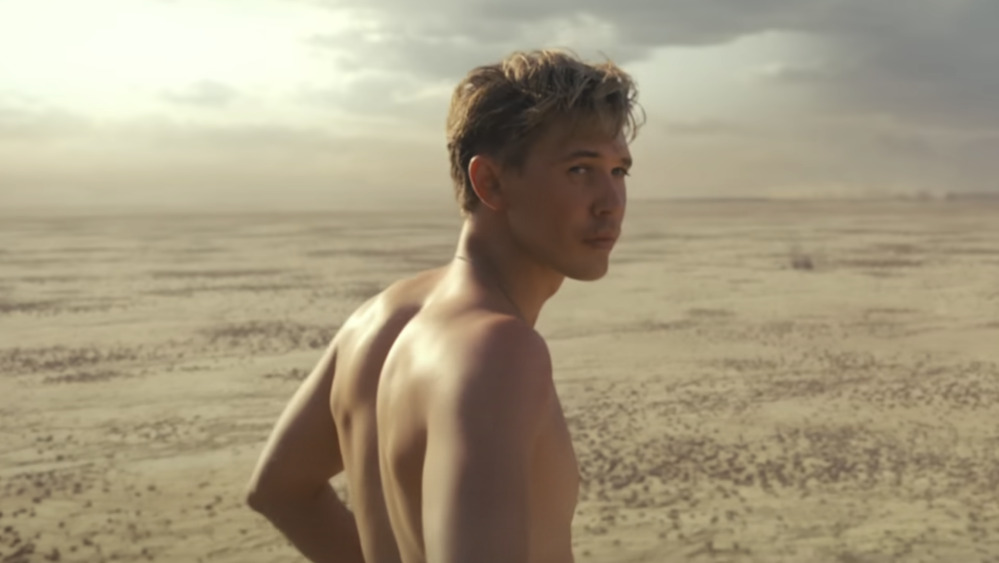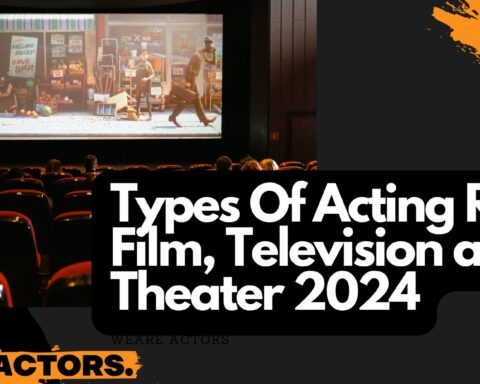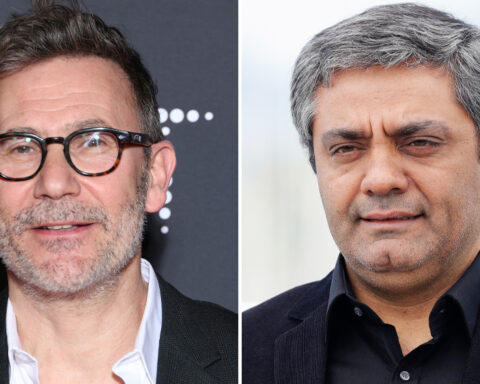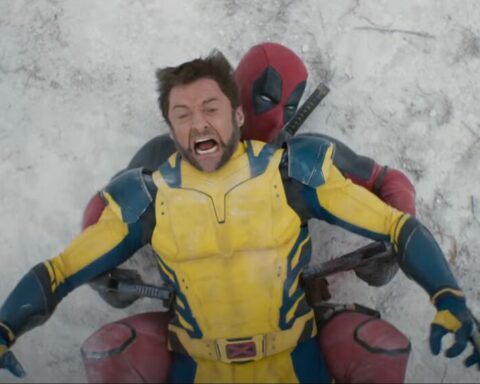Christopher Nolan is freaking me out.
“There’s a pretty simple argument mathematically for saying the world will end in nuclear Armageddon simply because that’s a possibility,” he’s calmly explaining. “Over an infinite timeline, it’s going to happen at some point.”
It’s hard to dispute Nolan’s logic that civilization will one day vaporize, but as he tops off his mug of Earl Grey tea from a small kettle on the table in front of him, he hits a slightly more hopeful note. “My optimistic human self has to believe we’ll find a way to avoid that, but I don’t take a lot of reassurance in the idea that mutually assured destruction has prevented a cataclysm so far. It’s the ‘so far’ that’s the problem.”
Nolan is something of an authority on the apocalypse. After all, “Oppenheimer,” his look at J. Robert Oppenheimer, the architect of the Atomic Age, is one of the most-seen films of this or any year. The three-hour, R-rated drama where the action mostly unfolds in laboratories and congressional hearings has grossed nearly $950 million globally, more than almost any recent Marvel movie. In the process, it’s reshaping Hollywood’s idea of what constitutes blockbuster entertainment.
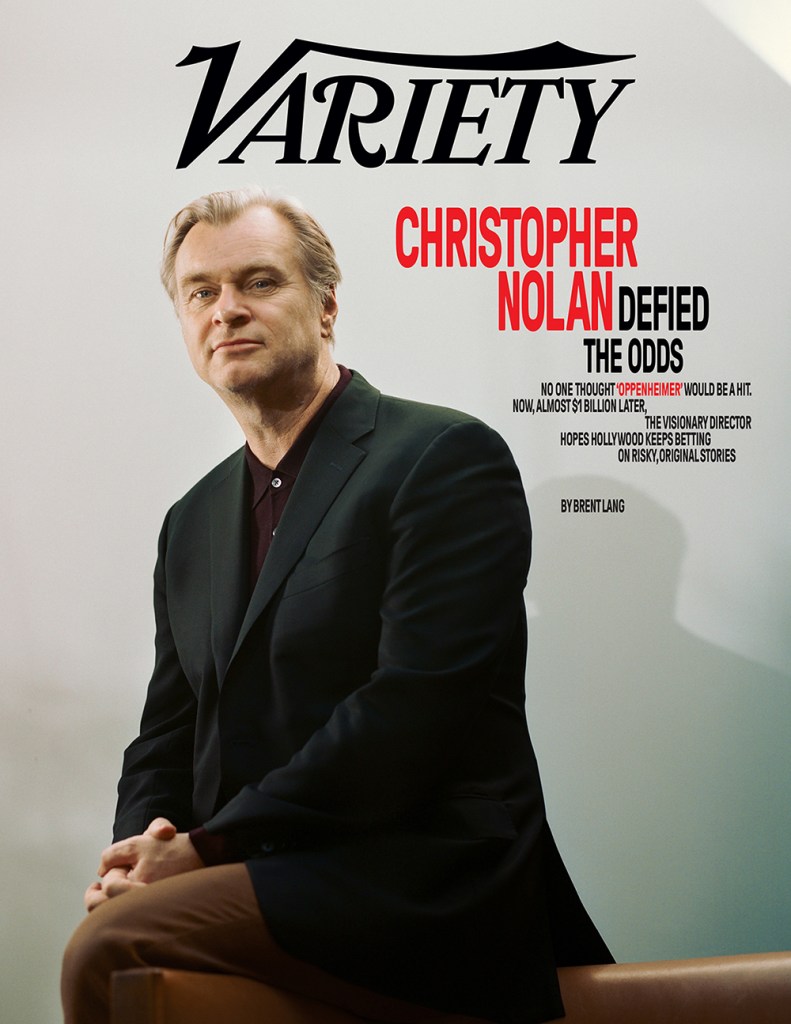
Over the past two decades, comic book adventures subsumed the movie business, with studios churning out an assembly line of sequels and spinoffs featuring superpowered heroes. But “Oppenheimer” reveals that audiences will turn out in record numbers for darker, more complex stories. That is, if they’re told with the epic flair that Nolan has honed in movies like “The Dark Knight” and “Dunkirk.” And it’s giving other filmmakers hope.
“Not only did ‘Oppenheimer’ work, but it seemed to work in defiance of received wisdom,” says Damien Chazelle, the Oscar-winning director of “La La Land.” “Before I even saw the film, it felt like one of those test-case scenarios. All around the industry, a lot of people were saying, ‘This is not what the audience wants — it’s a bummer, and they just want escapism.’ And they were all wrong. So that makes its success all the sweeter.”
Nolan is stunned by the grosses, as well as the Oscar buzz that “Oppenheimer” is generating. “With certain films, your timing is just right in ways that you never could have predicted,” he says. “When you start making a film, you’re two or three years out from when it’s going to be released, so you’re trying to hit a moving target as far as the interest of the audience. But sometimes you catch a wave and the story you’re telling is one people are waiting for.”
In this case, the film reached screens at a moment of roiling global anxiety. Russia’s invasion of Ukraine, which took place just as Nolan and his cast and crew were starting production, has elevated fears of a potential nuclear conflict. And when we meet on an October morning in a lifeless conference room in lower Manhattan, blocks from where the World Trade Center once stood, we are a week away from the terrorist attack on Israel, which has resulted in unspeakable violence in the Middle East and the prospect of a widening war. Our troubled world has only grown more turbulent since “Oppenheimer” was released four months ago.
“The awful truth of nuclear weapons is that concern about them ebbs and flows with the geopolitical situation,” Nolan says. “But it shouldn’t. The threat is always present, but sometimes an event will happen that brings it more front of mind. But that’s not how it should be; it’s a danger that hovers over the planet and will never go away.”
On the night “Oppenheimer” opened in July, Nolan sneaked his mom, his producing partner and (wife), Emma Thomas, along with three of their four kids into the back of the Imax theater at Manhattan’s AMC Lincoln Square to see how the sold-out crowd was enjoying the movie.
“I usually don’t want to go, but the minute I’m there, something magic happens,” says Thomas.
In the theater that night, as Oppenheimer and his team prepare to detonate the first nuclear weapon, Nolan felt viewers’ concentration intensify. “It was a remarkable experience to be there,” he says. “Every seat was filled, and the focus on what was happening on-screen was so strong. That level of engagement was something that I’d never really felt before. Real attention was being paid.”
On that morning downtown, Nolan, 53, is wearing a collared shirt, slacks and a blue blazer. He rarely deviates from this proper, vaguely professorial look, which colleagues say is intentional.
“His dressing style is a manifestation of the fact that he’s putting his energy elsewhere,” says “Oppenheimer” cinematographer Hoyte van Hoytema. ”He wears the uniform to make things easier for himself and to strip away the bullshit. He likes certain routines, and he hangs on to them in order not to have to think about anything else. He has such a hawk’s-eye focus on the task at hand. There’s no other director I’ve ever worked with who has such a specific devotion and dedication.”
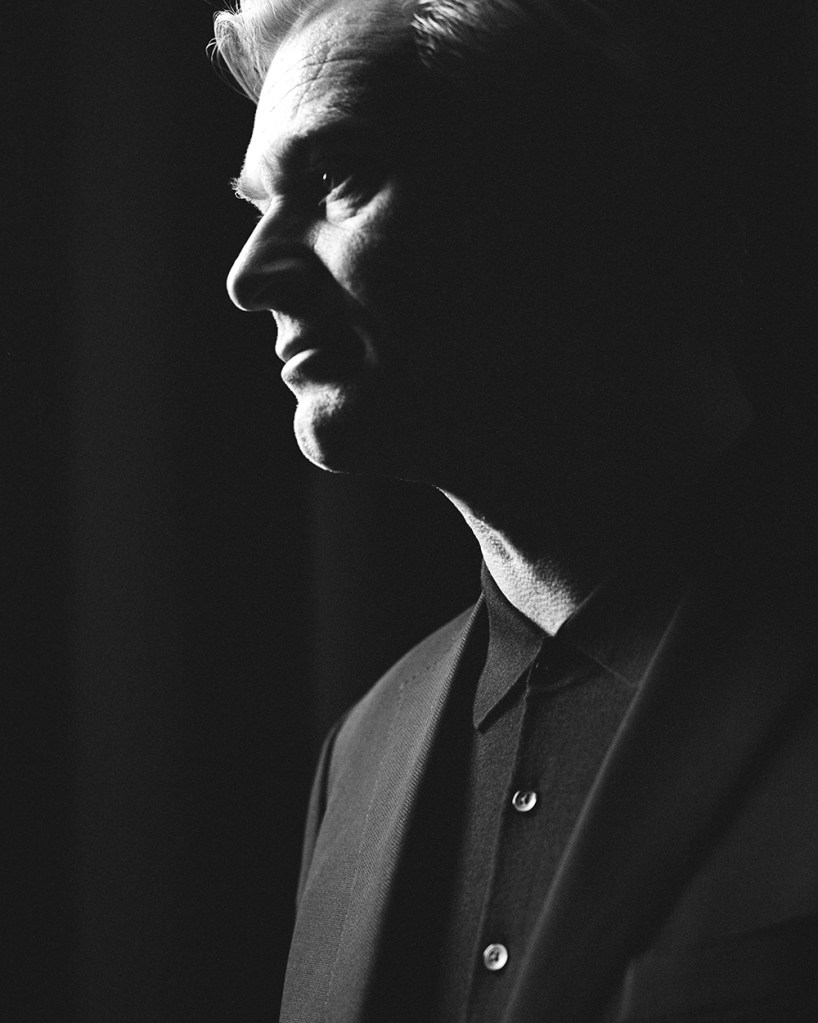
There are certain rituals on a Nolan production too. He shoots on film, even though most of the industry has moved to digital, using Imax cameras to give his movies the scope and scale that he prefers. And he surrounds himself with a close-knit group of frequent collaborators — from Cillian Murphy, who took the lead role in “Oppenheimer” after five previous Nolan outings, to van Hoytema, who returned for a fourth go-round with the director. Despite his films’ big budgets, he likes to keep his sets small, shunning a video village. And he discourages his actors from spending a lot of time in their trailers.
“There’s not a lot of waiting around,” says Thomas, “because Chris is fast and efficient when he works.”
Thomas, who has produced all her husband’s films and co-founded their production company, Syncopy, says Nolan maintains an atmosphere on set. “Chris is clear about what he needs,” she says. “But there’s also a sense of calm, which allows people to do their best work.”
When he’s not shooting a movie, Nolan takes notes about ideas that, more often than not, never become a finished film. “His office is a shambles,” says Thomas. “It’s filled with notebooks. There’s no method to them — there are sketches of things or a logo for a movie he’s going to make or a little bit of a story he may want to tell. He writes everything down.”
But Nolan doesn’t start writing a script until he knows he’s actually going to make the movie he sees in his head. That’s partly due to his experience writing a biopic about Howard Hughes in the early aughts. He loved the screenplay he’d finished and expected to cast Jim Carrey as the reclusive billionaire, but he had to abandon it when a competing Hughes project, Martin Scorsese’s “The Aviator,” went into production. To this day, he hasn’t seen Scorsese’s film, something he had to confess to its star, Leonardo DiCaprio, when they made “Inception.”
“It was very emotional to not get to make something I’d poured all that into,” he says.
The idea for “Oppenheimer” was kindled when Robert Pattinson gave Nolan a book of the physicist’s speeches at the wrap party for his 2020 film “Tenet.” Nolan had been born into a world where nuclear weapons were a fact of life, but he was struck by how Oppenheimer and his fellow scientists were grappling for ways to make sense of the destructive power they had unleashed. “It was a brilliant mind asking how we manage this change we’ve wrought,” Nolan remembers.
That led him to revisit “American Prometheus: The Triumph and Tragedy of J. Robert Oppenheimer,” Kai Bird and Martin J. Sherwin’s Pulitzer Prize-winning biography. It documented how a socially awkward academic became the unlikely leader of America’s efforts to beat the Nazis in developing an atomic bomb. It also chronicled the aftermath of that discovery, as well as Oppenheimer’s conflicted feelings about the nuclear arms race it sparked. Nolan began to see the cinematic potential.
“This was a man who was a remarkable combination of integrity, sincerity and theatricality,” Nolan says. “I’m drawn to complex and contradictory protagonists.”
For most of his career Nolan made movies for Warner Bros. He never had a production deal with the studio, but Warners put him on the A-list by selecting him to oversee its “Batman” reboot, leading to the hugely successful “Dark Knight” trilogy. Warners then released other Nolan hits, such as “Dunkirk” and “Inception.” But in 2020, with the pandemic raging and theaters struggling to draw audiences, WarnerMedia chief Jason Kilar decided to premiere a year’s worth of films on HBO Max, the streaming service that Warner Bros.’ parent company had recently launched. Nolan didn’t have a movie slated to open during this period, but he was incensed by the precedent. He released a statement slamming the strategy as a bad business decision, writing, “Some of our industry’s biggest filmmakers and most important movie stars went to bed the night before thinking they were working for the greatest movie studio and woke up to find out they were working for the worst streaming service.”
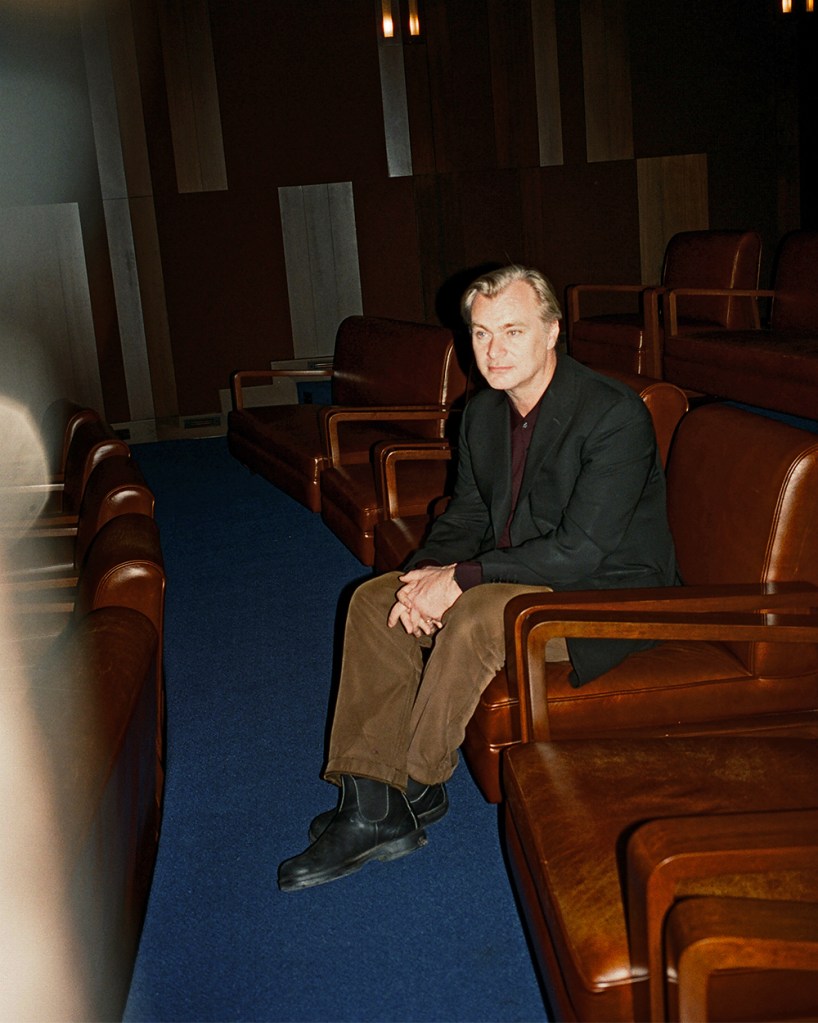
So it wasn’t surprising that when it came time to make “Oppenheimer,” Nolan went elsewhere, to Universal. He had established a strong relationship with its head, Donna Langley, while working on a film adaptation of the TV series “The Prisoner” several years before. He couldn’t quite “crack” the adaptation, he says, which went unmade, but the pair stayed in touch, with Langley seeing Nolan and Thomas for the occasional lunch. Nolan appreciated Langley’s reputation for protecting and supporting top talent, while the executive was eager to land the next film from such a high-profile filmmaker. Still, “Oppenheimer,” with its nearly $100 million budget and lengthy discussions of theoretical physics, was a risky proposition.
“A biopic at this length about this subject matter should not do well,” says Langley. “But when you factor in a filmmaker like Chris, who is undeniably theatrical and who has a strong following of fans ranging from teenagers to adults, that’s the differentiator.”
Nolan didn’t want to make the movie on studio sets. He wanted to immerse viewers in the world of his protagonist, so he shot the film on location in New Mexico, near where Oppenheimer’s team made the bomb, as well as in Princeton and Berkeley, where he spent most of his academic career. The production also used historical locations, filming scenes in the actual Los Alamos home where Oppenheimer lived with his wife and young children as he oversaw the Manhattan Project.
“The audience may not notice the difference, but shooting as much as we can on the real locations gives everyone so much more to tap into,” says Thomas.
“Oppenheimer” unfolds in two overlapping sections. One, shot in color, is told from Oppenheimer’s perspective and is set largely during World War II. The other, produced in black and white, centers on Lewis Strauss, an original member of the U.S. Atomic Energy Commission, as he clashes with Oppenheimer over the scientist’s eventual opposition to the development of the hydrogen bomb. Strauss’ anger over slights, real and imagined, sets in motion a plot to discredit Oppenheimer and deny him his security clearance.
Nolan’s film depicts the Trinity test, the first detonation of the bomb in the New Mexico desert, in nail-biting detail, but it does not show the destruction of Hiroshima and Nagasaki, an omission that Spike Lee and others have criticized. Nolan says that was intentional — Oppenheimer was half a world away when the bombs were dropped. He learned about their detonation on the radio.
“The film presents Oppenheimer’s experience subjectively,” Nolan says. “It was always my intention to rigidly stick to that. Oppenheimer heard about the bombing at the same time that the rest of the world did. I wanted to show somebody who is starting to gain a clearer picture of the unintended consequences of his actions. It was as much about what I don’t show as what I show.”
Oppenheimer did grow more concerned about nuclear proliferation, and he advocated for the creation of an international body to control the production of radioactive material. However, he never publicly criticized the decision to drop the bombs. It’s a debate that continues to divide people. So what does Nolan think?
“My research and my engagement with this story tell me that anyone claiming a simple answer is in denial of a lot of the facts,” he says. “Obviously, it would be much better for the world if it hadn’t happened. But so much of the attitude toward the bombing depends on the situation of the individual answering the question. When you speak to people whose relatives were fighting in the Pacific, you get one answer. When you look at the devastating impact in Hiroshima and Nagasaki, you get another.”
Nolan says that he and the movie he made are more interested in provoking discussion than providing resolution. “The film is an honest attempt to express my feelings about it,” he says.
Shortly after Nolan and Langley announced in September 2021 that Universal would produce “Oppenheimer,” they revealed that the film would open two years later, in July, the same month that the director had launched two “Batman” movies, “Dunkirk” and “Inception.” “Chris is somebody who likes tradition,” Langley notes.
Nolan may have had sentimental reasons for picking July for “Oppenheimer” to drop, but he couldn’t foresee the stiff competition his film would face when it was released. In April 2022, Warner Bros. announced that it would open “Barbie” on the same day as “Oppenheimer.” It looked like the studio wanted to kill Nolan’s movie.
Nolan deflects when I ask him about it. “It’s always daunting when you start to see how the competition for the summer is shaking up,” he says. “I’ve been releasing summer films for 20 years, and it’s always crowded.”
If Warner Bros. intended to hobble Nolan’s film, the plan backfired spectacularly. Instead of cannibalizing each other, the prospect of two major movies opening in the same weekend galvanized audiences. It inspired memes that encouraged people to turn the confluence of blockbusters — one a neon-pink comedy, the other a somber drama — into an unlikely double feature.
“People had forgotten what it was like pre-COVID,” says Nolan. “Not that long ago, there often was more than one big film opening on a weekend. That can be stressful for filmmakers, but it’s better for theaters.”
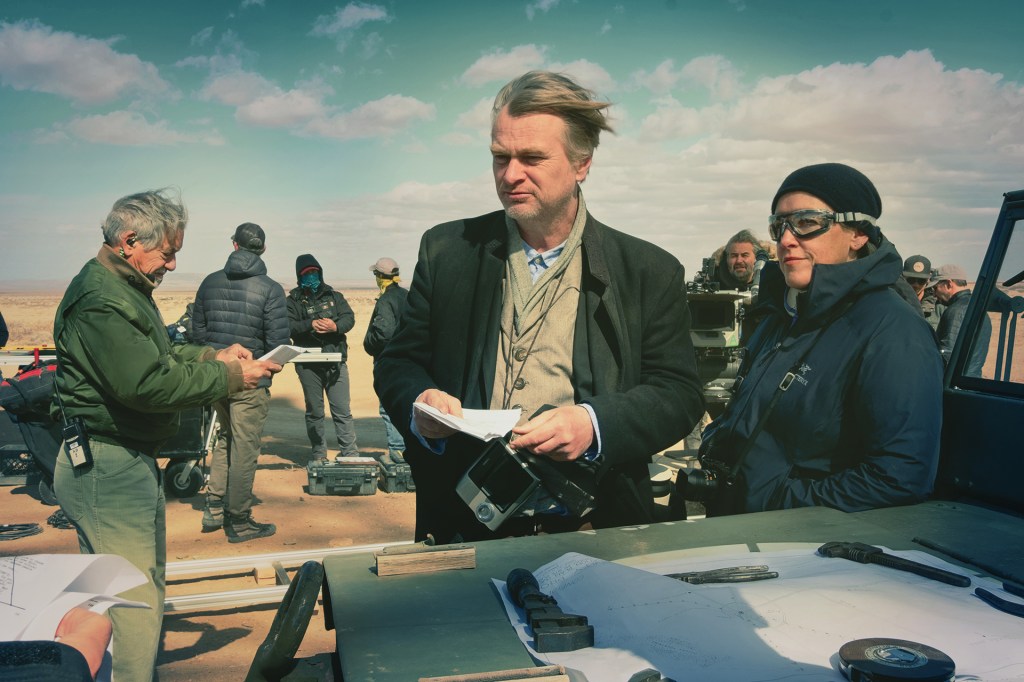
It also seemed like a sign that audiences are desperate for something that isn’t a reboot or a retread. For the first time since 2001, the year’s three highest-grossing films, “Barbie,” “The Super Mario Bros. Movie” and “Oppenheimer,” aren’t sequels or comic book adventures.
“It’s clear from the box office that audiences are looking for things they haven’t seen before,” Nolan says. “We’ve been through a period where it was wonderfully reassuring for studio executives to feel that their franchise properties could go on forever and be predictably successful. But you can’t deny filmgoers’ desire for novelty.”
Despite the drama involving the “Barbie” and “Oppenheimer” release date, as well as his criticism of Warner Bros., Nolan’s relationship with the studio isn’t irretrievably broken. “It’s water under the bridge,” he says of the feud.
For one thing, the media chiefs that Nolan came out swinging against are gone. AT&T, which had prioritized streaming above all else, sold a controlling stake in the company to Discovery in 2022. The newly rechristened Warner Bros. Discovery then installed CEO David Zaslav, setting the stage for Kilar’s exit. Zaslav also recruited new movie chiefs, Michael De Luca and Pam Abdy. So is Nolan open to working with Warner Bros. again?
“Oh yeah, absolutely,” he says. “Pam and Mike and Zaslav, they’re trying to do some great things with that studio, which is encouraging to see.”
It also helps that the entertainment industry, and Warner Bros., have begun to share some of Nolan’s skepticism about streaming. For a time, nearly every major media company was busy dropping licensing deals that allowed their movies to appear on cable or platforms like Netflix. They wanted to bolster subscriptions to their own streaming services by offering their movies exclusively on the likes of HBO Max or Disney+. However, as Wall Street looked more closely at the economics of these platforms, it found them overly costly and insufficiently profitable.
Nolan, who clearly understands the film business as well as the art, says he slammed the HBO Max plan partly because of the shoddy economics. And he thinks that Hollywood’s decision to push a streaming model above all else caused the writers’ and actors’ unions to strike this year because they weren’t earning the same type of royalties they once did.
“Part of the craziness with the labor negotiations this summer has been the studios sitting there and going, ‘Well, we can’t pay you because we don’t have enough money,’” Nolan says. “To which the answer is ‘Well, you don’t have enough money because you’re not managing your business correctly. You’re not getting the same amount of money for your product that you were before.’ The shift to streaming has disrupted the entire industry and created problems for everybody.”
‘‘Are you making me look amazing?” Nolan asks.
He is in high spirits as he calls me a few days after our initial meeting to answer some follow-up questions and to see how the story is progressing. That includes teasing me when I ask him if he’s thought about what’s next after the blockbuster success] of “Oppenheimer.” “Why? Do you have a script to pitch me?” he asks with a laugh.
It’s a warmer, droller side of Nolan, and one I haven’t experienced before. Not that he’s prickly — he’s unfailingly polite, generous with his time and thoughtful in his responses. Yet, he’s also keenly aware of how his remarks may be misinterpreted on social media or repackaged online, which can lead him to approach certain topics gingerly. For example, when I ask him if he’s seen “The Batman,” Matt Reeves’ recent film about the Caped Crusader, Nolan says he doesn’t want to answer that question. “If I start talking about comic book movies, that would be the only thing anybody pays any attention to in the article,” he explains. He’s probably right.
Nolan hasn’t made up his mind about the kind of movie he’ll make next. And when I push him on whether he’d return to franchise filmmaking, as he did so effectively with his “Batman” films, or if he’d prefer to make a movie purely based on an original idea, he leaves the door ajar.
“Ideas come from everywhere,” he says. “I’ve done a remake, I’ve made adaptations from comic books and novels, and I’ve written original screenplays. I’m open to anything. But as a writer and director, whatever I do, I have to feel like I own it completely. I have to make it original to me: The initial seed of an idea may come from elsewhere, but it has to go through my fingers on a keyboard and come out through my eyes alone.”
It will be intriguing to see how Nolan spends the capital he’s accrued from the critical and commercial success of “Oppenheimer.” Ever since “The Dark Knight’’ topped the box office, studios have been lining up to work with him. He’s used their interest to greenlight cerebral epics and historical dramas that others might have had trouble getting made. These movies, whether they take place in the streets of Gotham City or on the beaches of France, center on similar themes. Many, if not most, of Nolan’s films contain a warning: The search for knowledge is perilous. That danger is front and center in “Oppenheimer,” where the quest to harness the power of the atom creates unimaginable suffering.
“This film has impacted people and made them think very deeply about all the ways in which we can be our own worst enemy,” says Thomas.
“Oppenheimer” also feels like the culmination of a phase of Nolan’s artistic journey.
“There was a sense that he’s been working his way toward this film,” Steven Soderbergh, the director of “Traffic” and an executive producer of Nolan’s film “Insomnia,” says. “It required all the tools and experience that he’d had up to that point to pull something like this off. This was the cinematic equivalent of a mic drop.”
Realizing his bold vision cost Nolan something. The darkness of the subject matter, along with the existential questions it raises, weighed on him as he edited the movie. One stormy day in Los Angeles, he was returning home when he noticed raindrops falling on a puddle. It evoked the beginning of “Oppenheimer,” where the intense physicist stares down at rainwater sloshing on the ground. It’s a moment of contemplation for a brilliant mind who, over the course of the film, will become painfully aware of humanity’s boundless potential to build, as well as destroy.
“As I looked at it, I had a distinctly negative reaction,” Nolan says. “That gave me the faith that the film was working on me. And it made me glad to leave it behind, which I haven’t felt with my other films. I was ready to think about other things.”
“So, thank you,” he says jokingly. “Thank you for dragging me back into this.”

